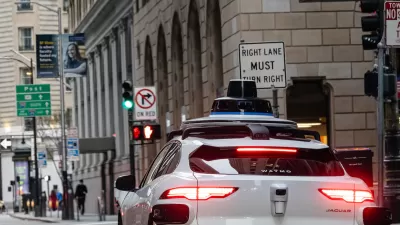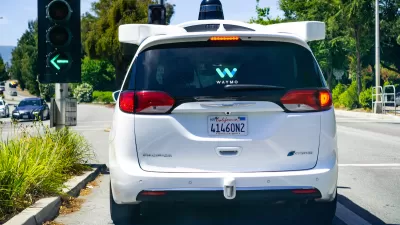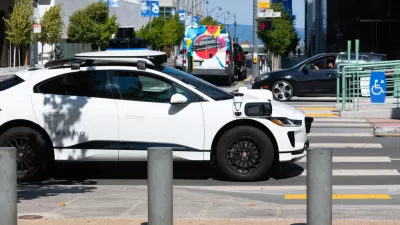Local officials want more control over how and where autonomous cars are deployed.

A series of proposed laws in California could clarify how commercial autonomous vehicles (or robotaxis) are regulated and give local governments more control over their deployment, reports Rebecca Bellan in Tech Crunch. “One bill, SB 915, stands out because it could give cities more power to set their own rules around robotaxis — things like hours of operation and appropriate pickup and drop-off locations.”
Self-driving cars became a major issue in California last year, when a state commission approved their deployment on city streets despite vocal opposition from local leaders.
Bellan outlines the proposed bills that will be considered in this legislative session, describing how each would impact AV deployment and regulation. Other bills require human operators in autonomous heavy-duty vehicles, call for geofencing protocols and more robust reporting, and open the door to fining car manufacturers for infractions committed by autonomous cars. None of the bills would allow cities to ban AVs outright, but industry leaders say the patchwork of regulations that will likely result from local control could slow the industry’s growth.
FULL STORY: A wrestling match over who should control robotaxis is playing out in California

Study: Maui’s Plan to Convert Vacation Rentals to Long-Term Housing Could Cause Nearly $1 Billion Economic Loss
The plan would reduce visitor accommodation by 25,% resulting in 1,900 jobs lost.

North Texas Transit Leaders Tout Benefits of TOD for Growing Region
At a summit focused on transit-oriented development, policymakers discussed how North Texas’ expanded light rail system can serve as a tool for economic growth.

Using Old Oil and Gas Wells for Green Energy Storage
Penn State researchers have found that repurposing abandoned oil and gas wells for geothermal-assisted compressed-air energy storage can boost efficiency, reduce environmental risks, and support clean energy and job transitions.

Private Donations Propel Early Restoration of Palisades Playground
Los Angeles has secured over $1.3 million in private funding to restore the Pacific Palisades playground months ahead of schedule, creating a modern, accessible space that supports community healing after recent wildfires.

From Blight to Benefit: Early Results From California’s Equitable Cleanup Program
The Equitable Community Revitalization Grant (ECRG) program is reshaping brownfield redevelopment by prioritizing projects in low-income and environmental justice communities, emphasizing equity, transparency, and community benefits.

Planting Relief: Tackling Las Vegas Heat One Tree at a Time
Nevada Plants, a Las Vegas-based nonprofit, is combating the city’s extreme urban heat by giving away trees to residents in underserved neighborhoods, promoting shade, sustainability, and community health.
Urban Design for Planners 1: Software Tools
This six-course series explores essential urban design concepts using open source software and equips planners with the tools they need to participate fully in the urban design process.
Planning for Universal Design
Learn the tools for implementing Universal Design in planning regulations.
Ascent Environmental
Borough of Carlisle
Institute for Housing and Urban Development Studies (IHS)
City of Grandview
Harvard GSD Executive Education
Toledo-Lucas County Plan Commissions
Salt Lake City
NYU Wagner Graduate School of Public Service





























